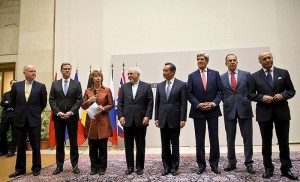 The third set of technical talks on the interim nuclear deal between Iran and the 5+1 Powers resume in Geneva on Monday.
The third set of technical talks on the interim nuclear deal between Iran and the 5+1 Powers resume in Geneva on Monday.
The talks are seeking to implement provisions of the November 24 deal, including Iran’s suspension of enrichment of 20% uranium and a start to relief of US-led sanctions on Iran.
The last set of discussions were held December 19-22. They have been conducted in strict secrecy, but Iranian Foreign Minister Mohammad Javad Zarif and Tehran’s lead negotiator, Deputy Foreign Minister Abbas Araqchi, indicated that progress had been slow.
Araqchi said the third round of negotiations will last only one day because of the New Year holidays.
Iran Prosecutor General: No Forgiveness for 2009 Protests
Iran Prosecutor General Gholam Hossein Mohseni Ejei has repeated that those convicted of taking part in the protests after the disputed 2009 Presidential election cannot be “forgiven”, and said the sentences they have received are the least they deserve.
The regime detained thousands of politicians, activists, lawyers, journalists, students, and other people challenging the “victory” of Mahmoud Ahmadinejad, sentencing many of them to long prison sentences. Hundreds are still behind bars, and 2009 Presidential candidates Mir Hossein Mousavi and Mehdi Karroubi — along with Mousavi’s wife, activist Zahra Rahnavard — have been under strict house arrest since February 2011.
Mohseni Ejei said the “sins” of the political prisoners were “much too great”: “They sullied the reputation and dignity of the Islamic Republic, They burned people’s belongings. They attacked Basij bases. They accused the regime and the people of lies and failed to honour people’s votes.”
He declared, “This is something that cannot be forgotten. It cannot be overlooked and diminished.”
Conservative MP Ali Motahari called in Parliament on Sunday for the judiciary to review the “severe sentences”, saying it should be free from all outside influences.
On Monday, the regime marks the 4th anniversary of a rally to meet the challenge of the demonstrations. Three days earlier, thousands of protesters had marched across Tehran, backing down the security forces who had blocked previous gatherings.
70% of Iranian MPs Call for Enrichment of Uranium to 60%
Almost 70% of Iran’s MPs have signed a bill requiring the Rouhani Government to enrich uranium to 60% if an interim nuclear deal with the US and other powers is not implemented, according to a member of Parliament’s Energy Commission.
“The signatures to the bill to require the government to enrich uranium to the level of 60% increased to 200 [of 290 MPs],” Seyed Mehdi Moussavinejad said.
The bill was initially supported by 100 MPs when presented on Wednesday.
Moussavinejad said, in case of increased sanctions against Iran and violation of Iran’s rights to use peaceful nuclear technology, “the Government will be necessitated to launch the Arak heavy-water reactor and also increase the level of uranium enrichment to 60% to provide the fuel needs of [the] engines” of Iranian nuclear submarines.
The measure is a response to moves by some US Senators, opposed by the Obama Administration, to mandate new American sanctions if the November 24 interim nuclear agreement is not fulfilled by Tehran. The “60%” level of enrichment is primarily symbolic: Iran uses 20% uranium for civilian programs and has no nuclear submarines requiring the further-enriched fuel.
By EA WorldView
The Iran Project is not responsible for the content of quoted articles.

 QR code
QR code